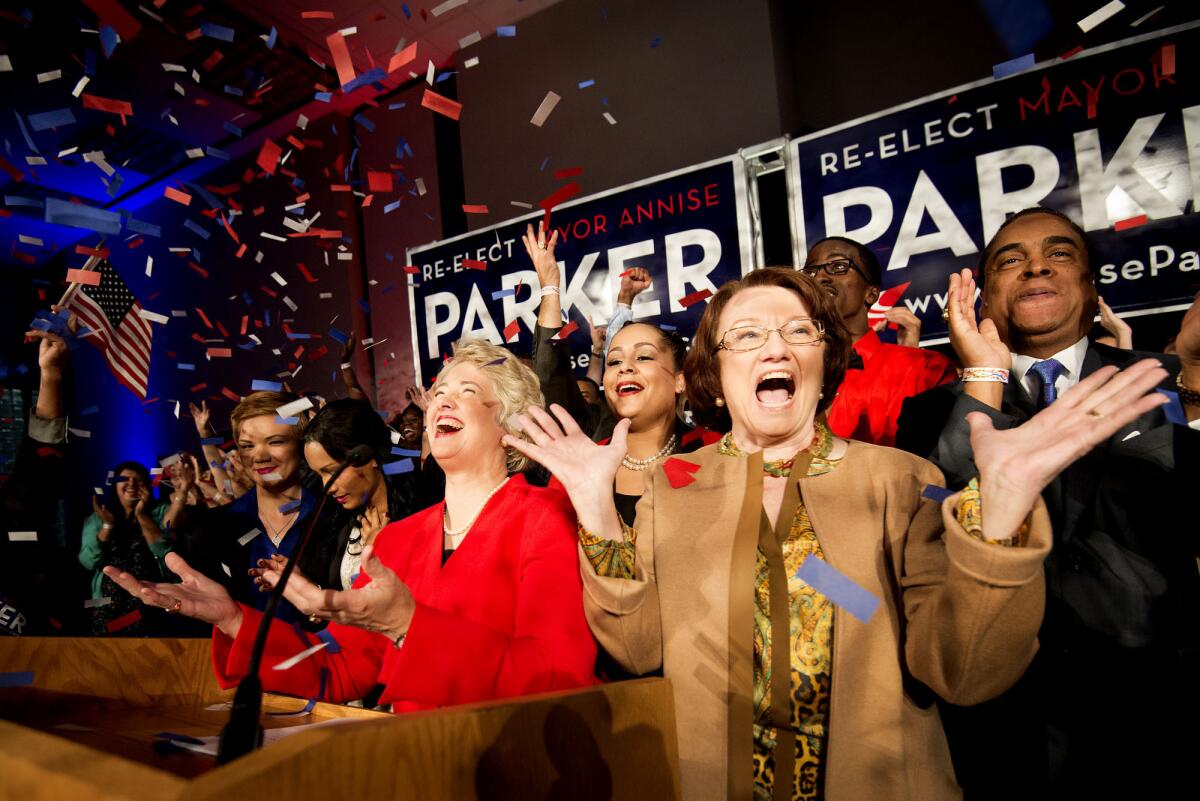Annise Parker, Democrat, wins 3rd term as Houston mayor

- Share via
Houston — HOUSTON--Houston Mayor Annise Parker staged what may seem like a political coup Tuesday, winning a third term in a red state during a year in which female candidates lost mayoral bids in Los Angeles and New York.
To top it off, Parker, 57, is a Democrat—and openly gay.
Parker won 57% of the vote election night compared with Republican challenger Ben Hall’s 27%.
That’s after Hall, an African American former city attorney, spent millions on his campaign in an effort to win over conservative and African American voters dissatisfied with Parker.
Big Texas cities tend to lean Democratic, islands of blue in a red state that has elected Democrats San Antonio Mayor Julian Castro, Dallas County Dist. Atty. Craig Watkins (the first African American DA in state history) and Dallas County Sheriff Lupe Valdez, a Latina lesbian.
But Hall’s main problem in Houston, experts said, was that Parker’s appeal reached beyond her Democratic base.
“The mayor has an image as a technocrat, a policy wonk, not an in-your-face left-wing activist. She’s not someone who really alienates conservatives,” said Mark Jones, chair of the political science department at Rice University in Houston.
While Hall lived in a mansion just outside Houston until last year, Parker graduated from Rice, worked in the oil and gas industry and lived with her domestic partner, Kathy Hubbard, and three children in an older home in the city’s historic Heights neighborhood.
Parker started out as a gay activist in college, was president of the Houston GLBT Political Caucus and has been open about her family, attending black-tie events with Hubbard. But, Jones said, “she doesn’t make a political issue out of it.”
“She’s first and foremost a mayor who focuses on policy,” he said. “Her life is one that people in Houston can really identify with.”
Before she was first elected mayor in 2009, Parker served on the City Council and as Houston controller. During her first mayoral term, she handled budget cuts without raising taxes, which Jones said earned her respect from conservative and centrist voters.
“Unless they can’t get past the sexual orientation, there are a substantial number of Republicans who are happy with her, or at least won’t go out and vote against her,” Jones said.
But what plays well in Houston has yet to translate to the suburbs or statewide races.
Republicans dominate the suburbs surrounding Houston. Texas Democrats haven’t won a statewide office since 1994. The last serious campaign was in 2002, when Tony Sanchez Jr. ran for governor, spending more than $60 million. All the Democrats lost, and the party has not fielded a competitive statewide slate since.
“The Democrats in Texas are clearly now an urban party,” said Jim Henson, who directs the Texas Politics project at the University of Texas at Austin. “The thing that people have to remember is that Houston is not Harris County and the surrounding suburbs. Once you get out of the city, the equation becomes much more complicated.”
Henson recalled how former Houston Mayor Bill White, another three-term Democrat, ran for governor in 2010. He lost to Republican Gov. Rick Perry, who garnered about 55% of the vote.
That does not bode well for the gubernatorial campaign of Fort Worth Democratic state Sen. Wendy Davis, who drew national attention this summer when she staged a daylong filibuster to block restrictive abortion legislation.
“Urban Democrats are not enough to get Democrats over the line statewide,” Henson said.
More to Read
Sign up for Essential California
The most important California stories and recommendations in your inbox every morning.
You may occasionally receive promotional content from the Los Angeles Times.














